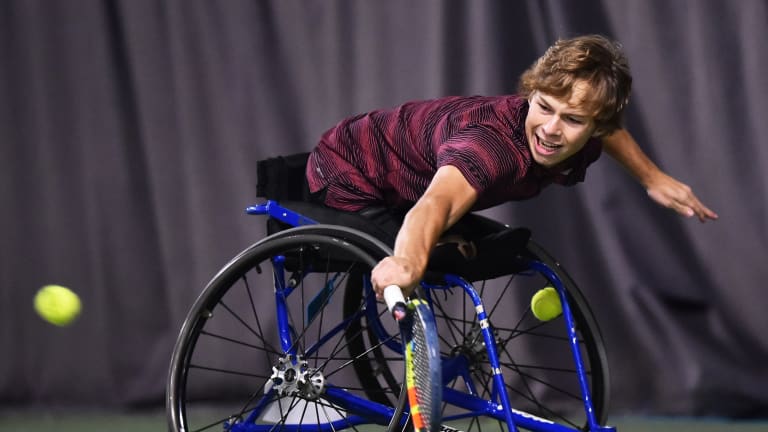LTA
That was the same year Stroud generated worldwide exposure, courtesy of a TV story produced and told by ex-pro Justin Gimelstob.“I was really thankful for Justin to be able to display my story and get it out to everyone who wanted to see it," Stroud said. "Hopefully, that helped some people.”
In the course of his time with Gimelstob, Stroud had the chance to meet Andy Roddick, Jim Courier and, Stroud’s hero, Rafael Nadal. “I had always liked Nadal’s game,” says Stroud. “He was one of my idols growing up, so when I met him, it was sort of surreal.”
Soon after his wheelchair tennis career began, Stroud rapidly earned respect from the sport’s leaders. “He’s a coach’s dream, such a hard worker,” says Los Angeles Tennis Club tennis director Cari Buck, who coached Stroud at several ITF and USTA wheelchair events from 2013-’17. Jason Harnett, USTA National Manager and Head Coach for Wheelchair Tennis, notes that Stroud’s early training in what’s called “able-bodied” tennis was a great asset as he made the transition to the wheelchair game. “He knew so much about how to play, how to manipulate the ball,” says Harnett.
According to Stroud, “It took me a year to get the movement down. It can make or break you.” By age 15, he was ranked No. 1 among U.S. juniors. Three years later, Stroud finished his junior career ranked number two in the ITF world rankings.
Grateful as Stroud was for singular success, he also relished joining forces with his fellow Americans. From 2015-‘17, Stroud was a member of the U.S. World Cup team that helped the U.S. win the junior event of the BNP Paribas World Team Cup (the wheelchair equivalent of Davis Cup and Fed Cup) three straight times. The ’15 title run marked the first time the U.S. had won the title since 2000.
In 2017, with teammates Chris Herman and Casey Ratzlaff no longer eligible to play juniors, Stroud became the senior man on the squad. “That was a great transformation,” says Harnett. “We asked Conner to stay on. It was great to see him dictating the quality of practices. He was vocal and setting the tone.” Says Stroud, “You’ve got to be vocal and encouraging. You need to show your teammates that you want them to win. I’d always been the younger one on the team, so this was a nice thing to be the leader and guide them.”
Stroud had hoped to compete at the 2020 Summer Paralympics in Tokyo, which were originally scheduled to start in late August. With the games now pushed back to 2021, Stroud is practicing diligently, including 90 minutes on the court every day, as well as extensive gym workouts.
He’s also taking real estate courses online and imagines a career in that field. Of course, all who come in contact with Stroud recognize the inspirational impact his journey has on people. “I could easily see him being a motivational speaker,” Buck said. Dewey concurs. “I’m just very proud of Conner and who he is. He’s always inspired people, in doing what he does. We’ve had that happen a lot.” As Stroud himself notes, “It does mean a lot to me, that even I can help one person, that’s a way of showing there are no limits to what you can do. Don’t let anybody tell you otherwise.”

